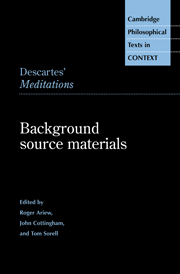Book contents
- Frontmatter
- Contents
- Preface
- Abbreviations
- General Introduction
- 1 Dialectic
- 2 That Nothing Is Known
- 3 The Promotion of Mathematics
- 4 Metaphysical Disputations
- 5 Wisdom
- 6 A Compendium of Philosophy in Four Parts
- 7 Corpus of Philosophy
- 8 The Use of Reason, The Impiety of the Deists, and The Truth of the Sciences
- 9 Unorthodox Essays against the Aristotelians
- 10 The Two Truths and The Immortality of the Soul
- 11 Dialogue on the Diversity of Religions and Little Skeptical Treatise
- 12 Universal Science
- 13 That God Exists
- Appendix: Condemnations of Cartesianism
- Bibliography
- Index
5 - Wisdom
Published online by Cambridge University Press: 05 June 2012
- Frontmatter
- Contents
- Preface
- Abbreviations
- General Introduction
- 1 Dialectic
- 2 That Nothing Is Known
- 3 The Promotion of Mathematics
- 4 Metaphysical Disputations
- 5 Wisdom
- 6 A Compendium of Philosophy in Four Parts
- 7 Corpus of Philosophy
- 8 The Use of Reason, The Impiety of the Deists, and The Truth of the Sciences
- 9 Unorthodox Essays against the Aristotelians
- 10 The Two Truths and The Immortality of the Soul
- 11 Dialogue on the Diversity of Religions and Little Skeptical Treatise
- 12 Universal Science
- 13 That God Exists
- Appendix: Condemnations of Cartesianism
- Bibliography
- Index
Summary
Introduction
Pierre Charron (1541–1603) was a lawyer-turned-theologian who was also a brilliant preacher. He served as vicar-general of Bordeaux from 1576 to 1593, and during that period came into contact with Montaigne, whose influence on him is evident. Charron lived during a time of intense religious wars, which he regarded as the playing out of uncontrolled passions. His De la sagesse (Wisdom) fits in with this preoccupation. It originally appeared in 1601 in Bordeaux. A revised edition was published in Paris in 1604, and the text for the present translation is that of the latter edition (Paris: Librairie Artheme Fayard, 1986).
Wisdom is a long work, in three books. Book I is a sixty-chapter account of the “parts” of human nature, including the body; the soul, the spirit, or mind; and the various passions. (The account of body, mind, and spirit does not look forward in any significant way to Descartes.) Book II is a general account of wisdom and how to achieve it; and book III considers wisdom more specifically in relation to the four virtues of prudence, justice, courage, and temperance. There are important connections between Charron's books I and III and Descartes' writings on ethics and the passions in the Discours and the Passions de l'âme. There are connections between all three books and Descartes' own remarks about wisdom in the preface to the French edition of the Principles of Philosophy. But the early chapters of book II have been chosen here for their connections to Descartes' Meditations.
- Type
- Chapter
- Information
- Descartes' MeditationsBackground Source Materials, pp. 51 - 67Publisher: Cambridge University PressPrint publication year: 1998



